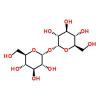I was thinking about this today:
Trehalose is a protein stabilizer and autophagy enhancer, has been shown to reduce pathological aggregation of proteins within cells in several diseases associated with abnormal cellular-protein aggregation as well as acting as an autophagy enhancer. We also know it is crossing the BBB and poses almost no risks .What about using it in the treatment of NPC type C? Might be a silly idea but....
The two diseases (atherosclerosis and NPC) have different underlying pathologies. Atherosclerosis very simplified happens when macrophages become engorged with fat and cholesterol and become pathological foam cells that line the interior of arteries.
NPC is a lysosomal storage disease associated with mutations in the NPC1 and NPC2 genes (or at least that's what wikipedia tells me). With NPC you get cholesterol deposits but you don't get the pathological foam cells. I think that for NPC, CD is make the cholesterol soluble so that it can be cleared out. For atherosclerosis it is doing that and causing foam cells to revert back to normal macrophages.
So for NPC, I think you're more interested in increasing the solubility of cholesterol, rather than the autophagy effects you get from trehalose. Whereas for atherosclerosis the improved autophagy is of therapeutic benefit. But, someone that is an NPC expert should be looking at trehalose.
I do think these two compounds would be synergistic at least for atherosclerosis.
You are absolutely correct but I think you missed my point completely.
I was not thinking about trehalose for the treatment of NPC because of its promissing results in the treatment of atherosclerosis but because of the human clinical trials in which trehalose is being used for the treatment of different types of ataxia mostly for the treatment of spinocetebellar ataxia. Keyword : autophagy















































